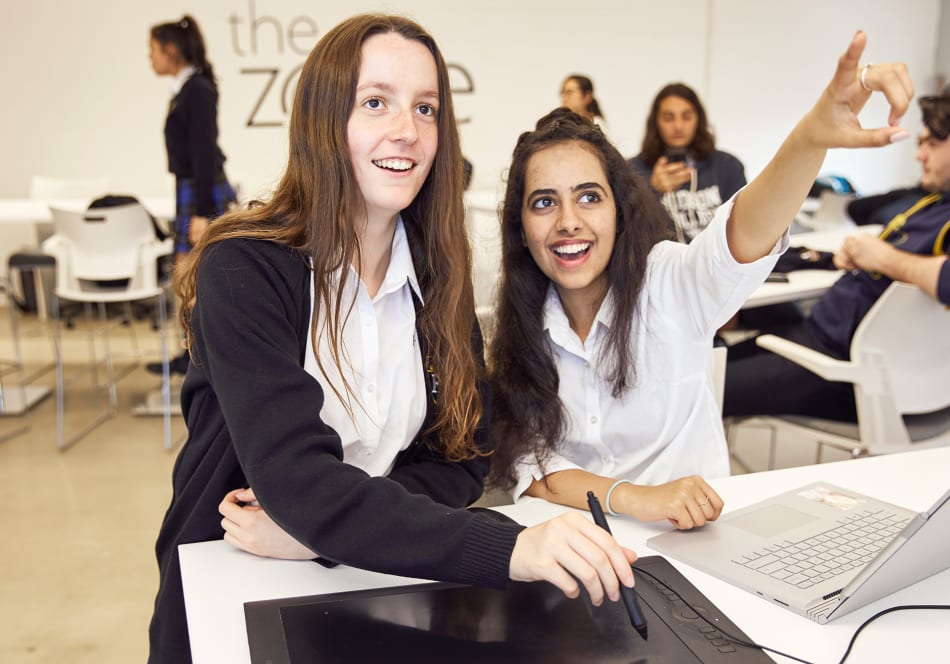Hudson College THE OUR KIDS REVIEW
The 50-page review of Hudson College, published as a book (in print and online), is part of our series of in-depth accounts of Canada's leading private schools. Insights were garnered by Our Kids editor visiting the school and interviewing students, parents, faculty and administrators.
Our Kids editor speaks about Hudson College
Introduction
There are many reasons parents choose to enrol their children at a private school, from family tradition to elite sports. Parents who choose Hudson College, however, are less interested in the extremes at the edges of the private education market, and more interested in the foundational elements of a strong academic program and a positive learning experience: social support, a sense of community, the flexibility to address student interests, and a consistent approach to curriculum development. Jeff Bavington co-founded the school to be a place where students with different interests, from different backgrounds, can feel part of a larger, inclusive community and shape the school environment. Above all, Hudson values its “Be Yourself, Be Anything” motto, which inspires all aspects of school life.
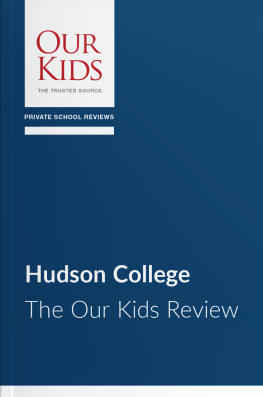
Key words for Hudson College: Community. Flexibility. Enrichment.
Basics/Background

Hudson College is a non-denominational, coeducational day school for students from JK through Grade 12. The atmosphere is supportive and progressive, beginning with a Reggio Emilia Kindergarten program that sets a tone of curiosity and collaboration that is carried through to the upper grades. Students are encouraged to engage with the entire spectrum of curricular and extracurricular programs.
The school was founded in early 2003, initially as a prep school that would accommodate Grades 7 through 12. Just as he was opening the doors to Hudson, founder Jeff Bavington recalls that his own daughter was starting her public school journey in Grade 1. “She’s my eldest, and a January baby, and the experience she was having at school wasn’t the start that I had hoped for her,” he recalls. At the time, he turned to his father and co-founder and said, “Let’s go for it; let’s make Hudson a K to 12 school.”
Within two years, both of Bavington’s children joined Hudson as students. Since then, the school has grown from its initial 13 students to a population exceeding 440. “We’ve seen more than 720 students graduate since our inception 20 years ago, and many of them continue to keep in touch with us, share their success stories, and remain part of the Hudson family,” Bavington says. “We’ve built a community that we’re really proud of.”
Bavington is as involved in the school today as he was when it began. Officially, he’s responsible for the school’s business operations, but his passion comes from the staff and students. “I like to try to meet with every student and family who applies to the school,” he says, “because that connection really matters to me.” Bavington knows all the students at Hudson and takes pride in their success and growth. “The kids keep me going,” he says, “their energy is contagious.”
Bavington’s route into education was perhaps a bit reluctant, but looking back, it’s clear he couldn’t imagine himself anywhere else. Education was the family business—his father, mother, uncles, and aunts were teachers and administrators. At family gatherings, he says, “that’s all I’d hear about.”
This backdrop granted him a front row seat to some of the innovations that would, in time, be adopted across the breadth of elementary and high school education in Canada. His father was at the helm of a large collegiate institute in Scarborough. Many of the ideals that informed his work there were considered “alternative” for the time, such as a greater attention to individuals and a desire to support all students, not just those achieving in the upper percentiles. Likewise, his father was aware that students could easily become lost within a student body that numbered in the thousands. He worked to change that, and Bavington was clearly impressed by the work his father did.
Today, Hudson remains committed to the same values it prioritized two decades ago. These include smaller class sizes that are capped at 20; strong connections between students, teachers, and the parent community; and above all else, happiness and a love of learning.
Atmosphere
Many of the ideals that are expressed at Hudson—the “Be Yourself, Be Anything” banner over the entryway, for example—are direct expressions of the work Bavington’s father was doing in the 1970s and ’80s. Typical of other private schools that are established by a single person or family, many of the school’s strengths come from the founders’ clarity of vision.
The overall atmosphere is one of invention, curiosity, and community encouragement. “When parents tell me how happy their child is, how stimulated, engaged, and challenged, that’s truly our measure of success,” says Michelle Gow, Hudson’s Director of Admissions.
The size of the school influences the atmosphere, creating a close-knit environment where students across all grade levels interact with one another. This can even be seen when new students come to visit the school. “Recently a little boy came to try out a day at Hudson, and he scraped his knee at recess,” Bavington recalls. “Well, a group of our Grade 4 students brought him into the office to clean up his knee, they cared for him and made sure he was OK, and at the end of the day when he was leaving the school he asked if he could knock on their classroom door to say thank you. There’s a kindness and respect you see in our hallways and schoolyard, and that’s a big part of our values as a school, something that’s really important to us.”
“Over the years, the school has grown large and diverse enough to let kids have a wide variety of experiences and opportunities,” says Lower School Principal Rose Bastien. Students who are athletic have a number of team and individual sports to try out for. The same is true of arts programs and annual events like the science fair and spelling bee. “A spelling bee can be stressful,” says Bavington, “but if it is done in the right way, the students learn that the risk of trying something new can be rewarding.” Because they aren’t a typical source of social currency, and sits outside the core curriculum, the spelling bee and other planned events, he feels, can provide some unique opportunities for growing self-awareness around risk tolerance and dealing constructively with disappointment as well as success. That kind of approach has proven to be key to Hudson’s success. “Feeling good about oneself, persevering, facing some adversity and disappointments,” says Bavington, “those are commonalities across everything they’re doing. If you put them in the right environment—an inclusive environment, where they can see that the others around them care about their own success, too—they will have a natural desire and need to improve themselves.”
Hudson is a place where students are encouraged to find their own voice, nurture their own interests, expand their horizons, and learn to be good friends and good humans. Academics are rigorous, but delivered in a way that ensures everyone will thrive.
Celine is a parent with three kids at Hudson and each is quite different from the others. Now four, six, and eight years old, they all came to Hudson in Kindergarten and continue to thrive at the school. “What I love about the school is that the teachers are all very different but extremely engaged,” she says. “And the students in all grades know one another and get many opportunities to interact.” For example, her son who is in Grade 1 plays soccer with older students at recess, and when he walks down the hall they greet him by name. “I really like that,” she says. “It’s such a warm community.”
Student life
“The class topics are enriched and very interesting,” explains a Grade 9 student in his first year at Hudson. “And if students are interested in the discussions, they will become engaged and not bored.” This is one of those students who is clearly engaged with what’s going on around him, like a light bulb floating in the middle of the room. He takes the TTC to school each day and manages his time from there. And he loves it: both the independence that the school gives him, as well as the support.
Still, that sense of belonging is something that he returns to when speaking about the school. “I don’t have to worry about other kids thinking it’s strange,” he says about participating in class. He likes the laptop program—every Grade 9 student receives one on admission—and, while he doesn’t say it explicitly, he likes being in an environment where it’s cool to be engaged, outgoing, and to like school.
“The students who do best at Hudson are those who are friendly, open-minded, and willing to persist,” explains Gow. “We are selective in choosing incoming students, but above all else, we want to focus on each individual’s potential.”
“Being in a large public school, I had really poor study habits,” explains another Grade 9 student. “I also lacked the ability to improve them.” As he headed toward high school he was beginning to get a sense of how important the next few years were going to be. He arrived at Hudson a bit reluctantly. His sister had also attended the school, and while his parents wanted him to join as well, he admits that he didn’t want to leave his friends. But he welcomes the experience Hudson has provided.
The real difference he found, on arrival, was that this was a place where social currency was, among other things, gained through academic engagement. “Being with teachers who wanted me to succeed,” he says, “was also a new and welcome experience.” And succeed he did. He took Grade 12 courses in Grade 11, joined more teams than he can bring to mind in a moment, and was also able to find time to play rep volleyball outside the school. Upon graduation he’ll be going to Waterloo, and from there on to medical school—a level of success that he credits directly to his experience at Hudson.
A big part of the student experience at Hudson is relationship building. “It all comes down to the relationship between the educator and the child,” says Bavington. “Being a K to 12 school we are in a unique position. For the kids who join us in Kindergarten, it’s a 14-year marathon, and any one teacher may only guide one leg of that journey. But if you do everything in your power to make that leg the best for that child, you will see, over the long haul, a permanent and lasting difference in their growth as a student and, more importantly, as a person.”
Small class sizes and this focus on relationships mean students can expect to get to know their teachers well and to form pivotal connections. “Our teachers work to bring our motto to life every day, helping kids become their best selves,” says Hudson’s Head of Guidance, Lisa Streff.
At Hudson, she explains, students aren’t just encouraged to join extracurriculars, but also to create their own clubs and teams. “We had a group of Grade 12 students this year who decided, for example, that if they didn’t make the volleyball team, they were going to create their own intramural team just for fun,” she explains. Similar initiative was taken by the Grade 8 students, who wanted to have a winter dance. Given the go-head by Bavington, who offered to cover all the costs if the kids could make it happen, a dance was organized and planned by the students themselves.
The size of the school and the close-knit nature of the community mean the students can take initiative and help shape their school life. “We try to engineer this to be the type of environment that promotes well-rounded students and raises young adults who try new things and follow their passions,” says Bavington.
“My kids take advantage of all the programs offered beyond the classroom,” Celine says. “My youngest participated in lunchtime karate and arts and crafts classes. My other children have joined multisport and Lego clubs. They’ve been on sports teams as well. After the pandemic, it’s been really nice to see a return to all of these great opportunities.”
Physical plan
Hudson is currently in its second location, having moved in its third year of operations. It occupies the site of the former Earlscourt Public School, a building it leases from the TDSB. The school celebrated its 20th anniversary in 2023 and sits within the well-established, diverse community of Corso Italia in central west Toronto.
The halls are abuzz with activity and the energy is palpable. It’s a vibrant school and there’s always something going on. The school completed its artificial turf field in the spring of 2021, which was initially bittersweet, as the opening occurred during the height of the pandemic when no sports were allowed to be organized or played. That is no longer the case, and all sports programs and outdoor activities are back in full swing, with students of all ages enjoying the benefits of the field and playscapes.
Hudson doesn’t present as a stereotypical private school, which is a net positive for parents and students alike. “When we came to Hudson for a tour I can say that everything about the school just felt right,” says Yana, a parent with daughters in Grades 9 and 12. “There was nothing pretentious about the students or staff, the science lab was impressive, and the art projects displayed on the walls were really good quality and they captured my attention.”
Other campus highlights include multimedia spaces with digital LED screens and integrated sound and video equipment for multimedia presentations, 3D printers, and a soon-to-be-launched Adobe Creative Cloud Lab. A ceramic kiln is being added to the school’s visual arts room, in addition to a digital recording studio for video and audio broadcasts and productions.
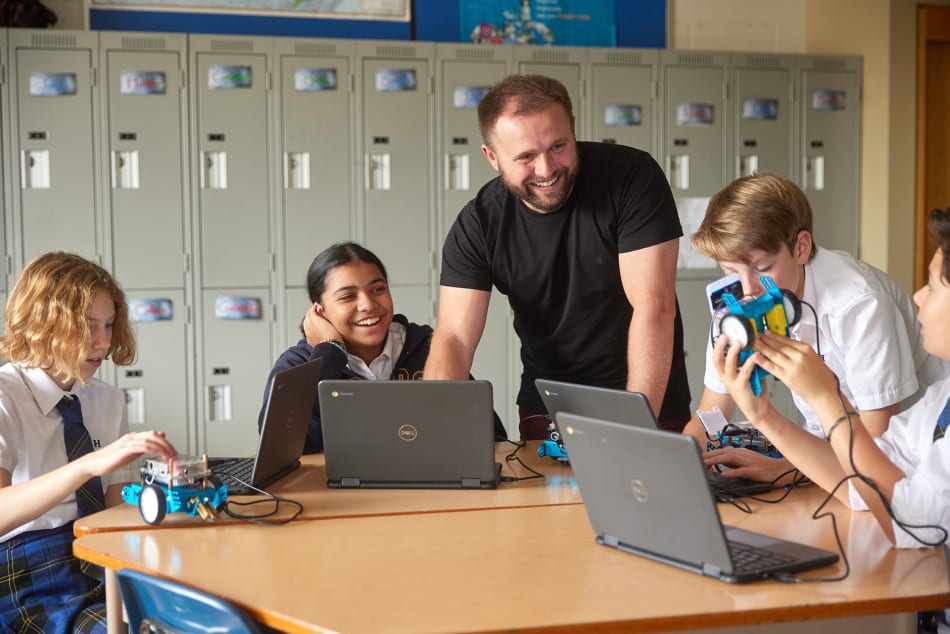
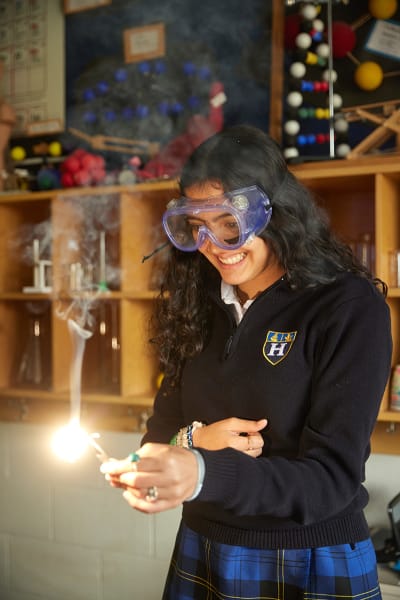
Academics
The academic program at Hudson was built with the understanding that contemporary children won’t have a single career over the course of their working life. Rather, they’ll move between careers and between different fields. This demands a strong foundation in the core curriculum, though they’ll also need to be able to adapt to a range of environments and new realities.
Certainly, that concept remains top of mind for the Hudson administration. Says Bavington, “What we tell kids, especially in high school, is that the skill set we’re trying to give you—beyond academics—is the transferability of different skills. Being flexible, having good communication skills, working well with people, being creative, being able to work independently and communally too.”
The adoption of a new math program in the Lower School a number of years ago serves as a case study in how the curriculum is continuously being assessed and developed.
There was a growing sense that the math used in the public system wasn’t meeting the needs of students, explains Rose Bastien, who is the head of curriculum and principal of the Lower School. She set out to find a program that would better align with the pedagogical approach used by Hudson. She hand-selected the Saxon math program and to this day, remains committed to its approach which includes daily math instruction and homework that’s to be done independently by the students.
“As Jeff always says, math is tied to self-esteem and is something kids often think they are inherently good or bad at,” Gow explains. “In reality it’s a muscle that can be strengthened with exposure, practice, and time, and we find our students, by the time they’re in Grade 8, are typically very strong and confident in math.”
There’s also an extensive focus on literacy and language, including spelling, grammar, and writing. From novel studies which focus on critical thinking, to extended writing assignments that ensure all students can write well-researched formal essays upon graduation, the school is committed to ensuring a love of reading and a confidence in writing among all students.
The key is to start young, says Bastien. “Good writing is like music, you can hear it, and our kids are writing well. How do we know? The high school teachers tell us that our elementary kids are ahead of the game by the time they get to Grade 9.”
Much of this success, Bastien explains, comes down to the way subjects are taught. “I have a background in special education and what I brought to Hudson from my background is the idea of universal accommodation.” While Hudson doesn’t provide specific curriculum modifications, what they do provide is a commitment to teaching in a way that works for all kids to be successful. “We recognize the uniqueness of every child and we utilize that to enhance their learning.”
Bastien also developed the middle school preparatory program. “The question I asked,” says Bastien, “was, What are the skills needed to help our kids do well in high school? What skills should our kids have when going into middle school?” What she found was that kids not only need the academic skills, but also note-taking, documentation, and executive functioning skills. This reflection resulted in the implementation of the program, which formalizes and consolidates these skills for middle school students in order to better prepare them for high school and beyond.
“The middle years program sees students going deeper into the curriculum, rather than accelerating,” Bavington explains. Students are challenged to master foundational skills and engage in critical thinking. There’s also a focus on social-emotional skill building including community service, executive functioning, and effective communication, among others.
In the Upper School, students choose from more than 25 electives across all subject areas from STEM to social sciences, and the arts. Hands-on learning is emphasized and teachers enrich the curriculum with advanced concepts, cutting-edge technology, and real-world applications. “Students experience university-level seminars, tutorials, and advanced lab techniques,” Bavington explains.
For Yana, academics were top of mind when she began searching for a high school for her daughters. “They went to a private French school for elementary school where academics were one of the strongest points, and I remember thinking it would be really hard to find something similar to what we experienced there.” Hudson, she reports, has more than lived up to her expectations. “My daughters were already good students when they started and Hudson has allowed them to flourish,” she says. “Our kids spend a lot of time at school, sometimes more time than they spend at home, and as such, schools help to raise our kids. I can say with confidence that Hudson is doing a very good job.”

The teaching environment
In math, Hudson scores within the top 99.3 percentile nationally on the Canadian Test of Basic Skills. “I love that,” says Bavington, though he’s also quick to make some qualifications. “I don’t want it to be the only barometer of the school. Ultimately the teacher you put in front of your child that year, the resources you give that teacher, and the overall guiding philosophy that you put in place—those are truly the factors that are going to help your child be successful.”
While Hudson recognizes the importance of academics, they also place great value on other things. “What adults often forget, I think, is what it was like to be a teenager or a child,” Bavington says. “You want to do well at school, but you need other things to feel good about, which in turn help your academics. Yes, we want to teach them well and build their academic skill set, but we don’t want to do that in a vacuum of other skills such as leadership, public speaking, trying out for athletic teams … we give them every opportunity to be able to try and succeed at different things.”
When it comes to academics, part of the school’s overall success, Bavington explains, is understanding the individual child and also having that child understand themselves. “We want students to be able to address what they see as their weaknesses. Writing is a good example. It’s a skill you have to practice all the time because it’s very rare to be a naturally gifted writer. And so we give students the opportunity to do that. They work at it and they practice and they improve. It’s not a light switch you can just turn on. By working with individual students and the class as a whole, our teachers help build on those skills until students feel confident in their abilities.”
With math, confidence is key to success at Hudson. “We find that the Math Makes Sense program and the discovery-based math approach that they use in the public system, in our opinion, does not provide a good foundation in mathematical principles,” Bavington says. “So now you’re in Grade 5, you have fractions, factoring, you’re having to deal with numerators and denominators, order of operations, geometric properties—and if you’re still trying to find that 5 times 7 is 35 and you can’t do it automatically, math will become a very tough subject for you. So, a skill or a subject that could be a strength becomes a perceived weakness. And that perception of yourself, academically in that subject area, can really start to drive how you perform.”
Parents echo Bavington’s sentiments. “My daughter came to Hudson from the public system and despite not having any academic problems, her confidence was on the floor,” James tells us. “She was a very physical and visual learner and those learning styles weren’t supported at her public school. After years at Hudson, this is a girl who has way more confidence to believe in herself. The academics are very important, obviously, but they weren’t the sole source of my daughter’s overall success.”
Nurturing committed, caring teachers is something Hudson also takes very seriously. With that comes regular meetings, lots of guidance, and a community approach to teacher training. As Bastien explains, “Our team discussions always relate to the curriculum, what kids are doing, how they’re performing academically, how they’re doing socially and emotionally.” As the Lower School principal, Bastien says she also meets with each teacher every eight days for 50 minutes to discuss their classroom and the specific students they see having challenges, needing extra support, struggling socially, or requiring some enrichment. From there she can ensure the needs of each student are being met.
“...now four years later this is a girl who has way more confidence to believe in herself.”
Pastoral care
“As a founder and director,” James tells us, “Jeff Bavington is incredibly accessible.”
Knowing the kids by name, listening to their ideas and personally committing to bring them to life, working closely with teachers, and building and nurturing community within the school are just some of the ways Bavington personally contributes to the Hudson culture.
Certainly, size can be a real benefit. Where larger schools institute advisory programs, in a smaller school, and with the right approach, individual attention is more consistent and comes with less effort. Hudson provides a good example. The environment is intimate, with a very rich interface between students and instructors.
At all grade levels, students at Hudson have a variety of leadership opportunities and student-led initiatives to acquire essential life and social skills. One such example is the Mentorship Program, through which older students help new and younger peers feel included, connected, and ready to participate in school culture. The school is also developing a locally established Pre-U course on coaching and peer education, which will teach students theoretical backgrounds and practical applications of leadership, teamwork, and global citizenship.
“When my daughter started at Hudson in Grade 9 she came not knowing anyone and I was worried about the adjustment,” says Yana. “But the school welcomed her with open arms and her experience was wonderful from day one.” From Guidance-led support in choosing classes to providing a safe place for students who just need to talk, to the mentorship program that allows older students to mentor newcomers, Yana says the school provided just the right amount of support for her daughter to ensure she felt comfortable and could be successful.
As part of the Hudson’s House League, four Houses—each representing a different region of Canada, from East to West—compete for the Discovery Cup. Regular House events and challenges throughout the year, from Homecoming Week to the June Day Fair, offer the opportunity to build leadership skills, camaraderie, and form friendships across grade levels. Students are integral to the planning and development of these events, with an elected House Council to represent and organize students.
Student well-being is top of mind at Hudson, especially in the years following the pandemic. While the focus at Hudson is academic success, there’s a huge emphasis placed on balance and finding joy within the school experience. “We want kids to look back on these years as a happy time in their lives,” says Bavington. That’s why there’s always an emphasis at Hudson on balancing in-class learning with extracurriculars, sports, teams, and other programs that encourage students to follow their passions.
Even the school’s admission process has been designed to eliminate stress. “We keep things relatively fluid with the goal of getting to know students and their families and determining whether or not their values and goals are in alignment with ours,” Gow explains.
Teachers are highly attuned to the mental health issues related to the social and emotional development of elementary students, Bastien explains. “We incorporate mental health and well-being into our teaching practices, maintaining close relationships with our students such that teachers are available to mentor and guide students.”
When it comes to social justice, the focus at Hudson is broad and extensive. “The Lower School prides itself in incorporating social justice topics into its curriculum so that our students are able to develop an awareness and a responsibility for issues in both the local and global community,” explains Bastien. “Our Grade 8 students begin the year with the Charity Project. Registered charities are picked by different Grade 8 groups and they research and present the charities to the Lower School student body.” The project sees each group’s charity compete for votes among the Lower School student body and the winning charity becomes the recipient of monies raised throughout the year through activities such as the annual art show, entrance donations for the Junior and Senior plays and holiday concerts, and various bake sales.
“We want our students to understand the importance of being empathetic, civic-minded citizens and we help to provide leadership opportunities that allow them to get involved in and improve our local communities,” Bastien says. In the Upper School, the student-run Justice League club organizes monthly initiatives to raise funds and awareness around different issues and causes.
Teachers become leaders in providing learning opportunities for important social issues as well, Bastien says. Workshops, school trips, and curriculum resources are all organized into learning experiences for the students. She explains: “The ‘Get Real Movement’ provides student workshops on LBGTQ+ and Black History to our students. These workshops supplement the classroom discussions related to these important topics. Teachers are also provided with grade-appropriate curriculum resources for lessons on the residential school system, truth and reconciliation, and the Holocaust, among other issues.”
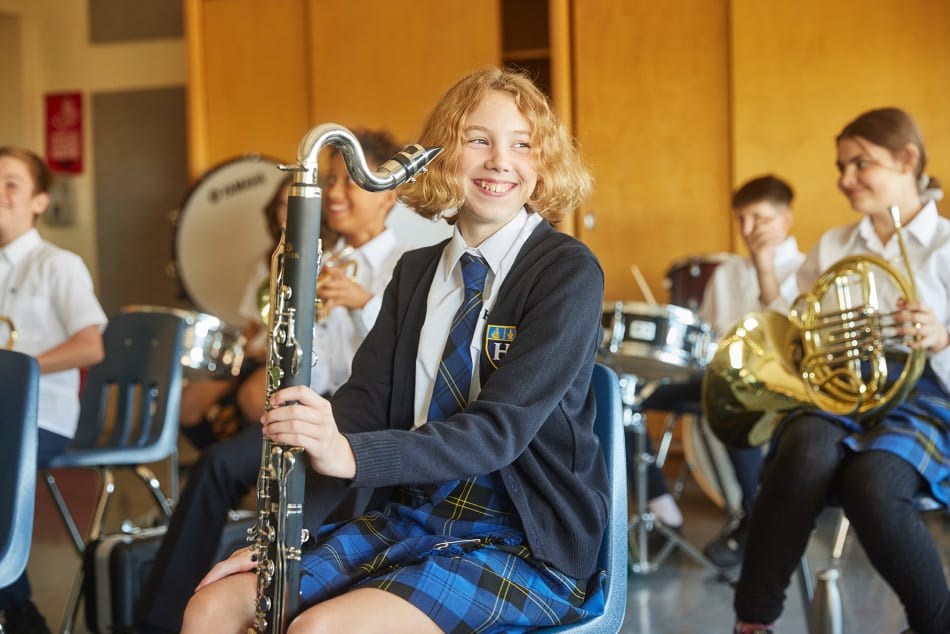

Extracurriculars
No school can reflect all possible interests, nor do they intend to, and that’s true of Hudson as well. The extracurricular programs are intended to support the entire student body. That’s a function of intent as well as the size of the school.
In some ways, the offerings are more varied and diverse than you might find in even a larger school. Students can join co-curricular and after-school clubs and activities offered by teachers or find a sponsor for a new club. Each year brings different options—past clubs and activities have included art, book, chess, choir, cooking, creative writing, Dungeons & Dragons, dance, debate, drama (school plays and musicals), gardening, eco, knitting club, Lego, math, robotics, science, soccer skills, and yoga.
“We had student interest in robotics and coding so we brought in an outside team to begin running after-school teams and activities,” Bavington explains. “We immediately saw the impact those programs were having, so we found a teacher and brought robotics and coding programs in house. The results have been fantastic.”
The teachers, too, are seen as a vital resource for ancillary programming. While there are some core offerings that remain year to year, instructors are also encouraged to share their personal interests with the students. “They all have very unique interests,” James explains. “They have interesting lives that they bring to the school, and rather than trying to get away from the school at the end of the day, they bring that in.” For example, two of the staff created a cooking club, and brought in an acclaimed professional chef to judge a friendly Iron Chef-style competition.
Most recently, Hudson’s Grade 8 music teacher helped put together Hudson’s Got Talent, the first show of its kind at the school. Several parents, including one well-known author and entertainer, formed a panel of judges and students had the opportunity to perform. “The kids really blew us away with their performances and for many it was a chance to step outside of their comfort zones and really try something new,” Bavington says.
Athletics and outdoor education
The athletic program is broad, with an impressive list of activities on offer. The school has a good range of facilities, and administration has been creative when building programs, reaching out to community partners to augment the offerings on campus, including golf, martial arts, swimming, yoga, and dance.
The athletics program, focused on the Hudson Huskies, provides team spirit and sense of identity and belonging. The school has both competitive and intramural teams and is a member of the Small Schools Athletic Federation (SSAF), an association of 70 independent and private schools in the area.
The outdoor education program, too, benefits from partnerships with established camps, including Camp Muskoka, Camp Wenonah, and Camp Kandalore. Says Bavington, “I often found, as a child, I looked forward to the camps that I went to in school or in summer time and I wanted that to be a tradition here.” Students go up each year, “so they get to be outdoors, they get to do team-building games, they might cook morning breakfast at a campfire and participate in a number of social games and interactive sing-alongs at night under the stars.” He gets a bit wistful saying that—he uses descriptors like “sojourn” when discussing these trips—which is as charming as the program itself. “And if there are any parents who are nervous because their child has never been away from home I will say, ‘Well, that’s why we’re sending them.’ I see it as a tremendous personal growth experience.”
In the post-pandemic world, the return of camps is even more special and appreciated by staff and students alike. For many years the school has sent the Grade 4 to 6 students to Camp Muskoka. The Grade 7s and 8s attend Camp Kandalore, which represents a step up from the earlier years, and as kids grow through into high school, the trips become progressively more robust. The Upper School makes annual trips to Camp Wenonah, a true outdoor education experience.
All of it, from physical recreation, to team sports, to outdoor education, has been developed as an expression of the core mandate of the school, namely to provide opportunities for students to grow their interests, to discover new ones, and to experience the full range of school life. The athletics mission is to provide a “variety of experiences in athletics while instilling the core values of physical literacy, respect, leadership, and integrity.”
“I encourage all our students to participate in our competitive and recreational programs,” says the athletic director, Marco Reda, while also ensuring that “there is a place for everyone who wishes to participate.” It’s an admirable goal, and parents confirm that the program succeeds in reaching it.
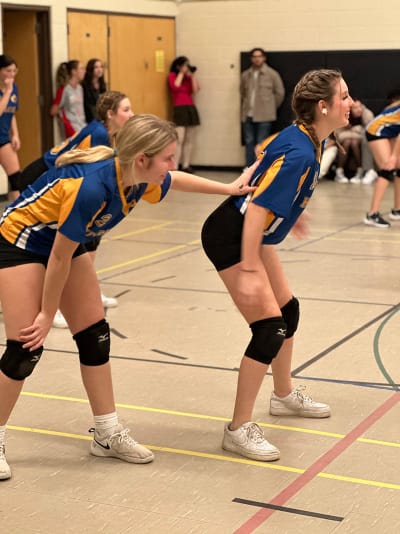
Admissions
Students are assessed in the typical metrics that we associate with private school admissions. All families are required to visit the school, and students from JK to Grade 8 are asked to spend a day there, attending classes as they would once enrolled and completing an assessment that focuses on math and language skills. Students applying for the Upper School are asked to come in for an interview with the Head of Guidance. There are two key application deadlines in the fall and winter. That being said, Hudson works with rolling admissions with applications being accepted at any time during the year. Applicants for key intake years—Kindergarten, Grade 7, and Grade 9—are advised to submit their applications as early as possible to ensure that a space will be available for them.
The admission process is clearly organized around fit, from both the family’s perspective as well as the school’s. “Every school is different,” says Bastien, “there’s a right school for every kid. So whether or not it’s our school, I think the most important thing for parents is to be able to say this is the right choice for my child.”
For the school’s part, they are looking for students who embody the values of the Hudson community and who are willing to avail themselves of all aspects of student life. They don’t have to be great in all things—and certainly no student is—but, as grade and age appropriate, they should be open to trying new things and discovering new things about themselves.
...it also has a lot to do with being financially savvy, coupled with a desire to keep the fee schedules clear, fair, and free of any surprises
Money Matters
Fee schedules, of course, can vary widely between schools, often including a range of incidental costs and fundraising. When it comes to Hudson, transparency is key. “We want to keep costs down as much as possible,” Bavington says. “If we are going to raise fees, we have to ask ourselves, what’s the purpose and how will that make an impactful difference in the classroom?”
This is in part because Hudson isn’t a not-for-profit institution, as many private schools are. That said, it also has a lot to do with being financially savvy, coupled with a desire to keep the fee schedules clear, fair, and free of any surprises. The only incidental above annual tuition is a $600 annual materials fee. Textbook costs are covered up until Grade 8.
“Cost was a factor for us,” says one parent, though she has found the fee schedule to be fair and manageable. “It’s not a huge amount for what you’re getting,” she says in reference to the one-on-one care, the individual attention, and the quality of teaching that she’s seen since enrolling her daughter in Grade 1.
“We don’t have scholarships provided by alums because we don’t have 80 years of history like other private schools,” Bavington explains, “but we do offer bursaries on a case-by-case basis if there is a student who we think would be an amazing addition to the school and can’t afford the full fees.”

The takeaway
“Kids who graduate from Hudson will leave with the ability and openness to try new things,” says Head of Guidance, Lisa Streff. Students who come to the school feeling uncertain quickly find their place within the school community and begin to adopt the “Be Yourself” motto. “It’s easier for students to feel more comfortable leaning in and exploring their curiosity when they have others around them doing the same,” she says. “The things students learn here about themselves are things they’ll carry with them throughout their lives.”
For one Hudson family, there was a great deal of back and forth before settling on private education in general. Though both parents had gone to private schools themselves, they weren’t sure it was the right choice for their children. “We enrolled our daughter in Hudson and within weeks we saw her open up and grow. It became a no-brainer for our son to attend. Above all, better than anything else, I see the difference the school has made in my children’s lives.”
No school is typical, and that’s certainly true of this one. “Jeff’s philosophy is that it’s not just about academics,” says Bastien. “It’s about friendship and being able to experience new things. We would never say ‘No, you can’t be part of the play.’ We would find a place for that child. And I think that’s the beauty of the school. It’s just a really good place to grow up in. Kids are happy here. And what parent doesn’t want that?”
Hudson’s reputation is one for supporting learners who are capable academically, but who have yet to find an environment that allows them to express their personalities and their interests. “One of the things that I’ve found particularly joyful in all my years of doing this,” says Bavington, “is seeing the wide array of students that we’ve had.” A boy once visited the school with his parents and asked, “Mr. Bavington, can I like art and history here?”
“Part of his reasoning was that while he was already very tall, he wasn’t that great at basketball or sports in general. He wanted to learn more about art and history. At his previous school, he had been teased due to his perceived lack of athletic skills, and for him that became a defining element. He wanted to know from a 10 year old’s perspective, ‘Can I just be me?’ ” That child graduated from Hudson and went on to study arts and sciences at university.
It’s significant that, when asked about the ideal Hudson student, that’s the story that Bavington tells. Where some schools express their success in Rhodes scholars, or members of parliament, or professional athletes, for Hudson, the greatest barometer of success is an ability to allow children to grow in their own ways, to find their own voices, and to be themselves.
